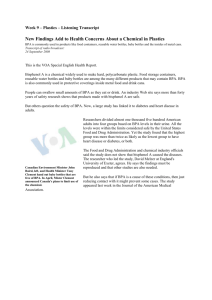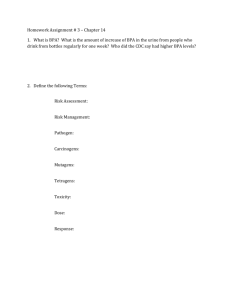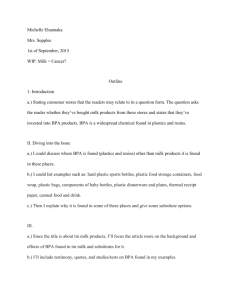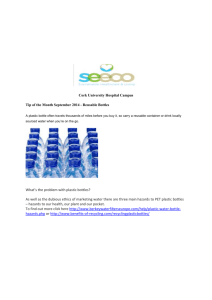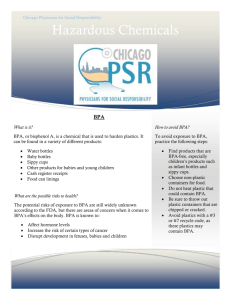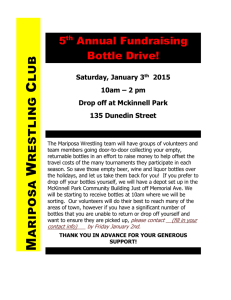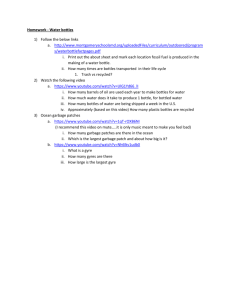Results of a new bi-national study demonstrate the risk to infants
advertisement
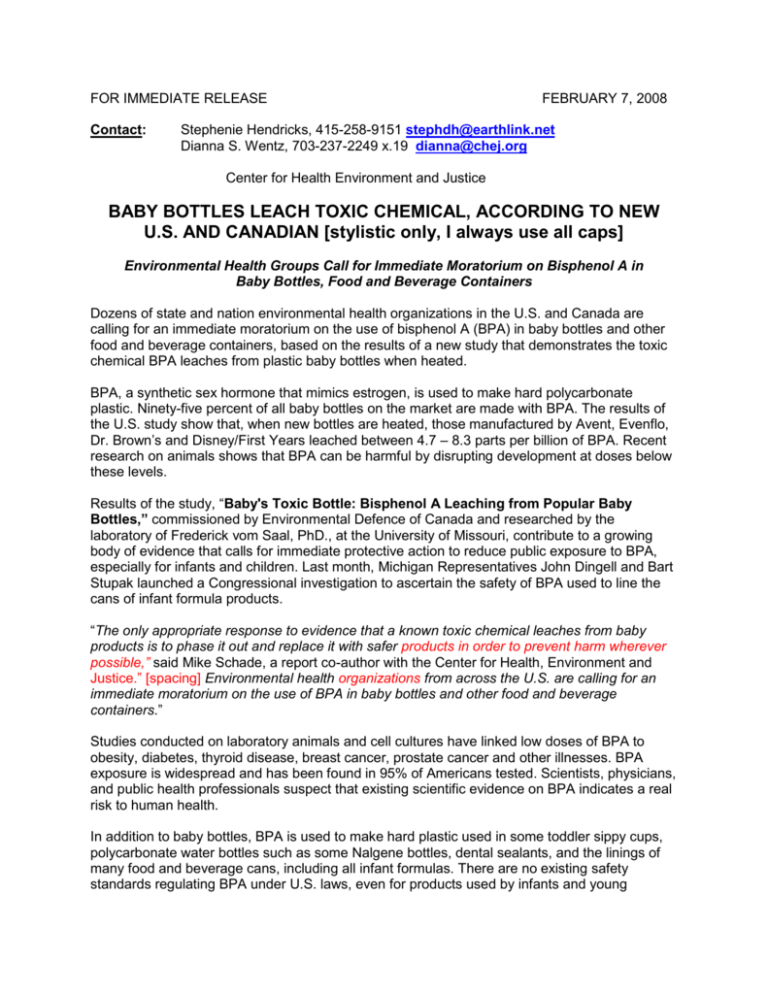
FOR IMMEDIATE RELEASE Contact: FEBRUARY 7, 2008 Stephenie Hendricks, 415-258-9151 stephdh@earthlink.net Dianna S. Wentz, 703-237-2249 x.19 dianna@chej.org Center for Health Environment and Justice BABY BOTTLES LEACH TOXIC CHEMICAL, ACCORDING TO NEW U.S. AND CANADIAN [stylistic only, I always use all caps] Environmental Health Groups Call for Immediate Moratorium on Bisphenol A in Baby Bottles, Food and Beverage Containers Dozens of state and nation environmental health organizations in the U.S. and Canada are calling for an immediate moratorium on the use of bisphenol A (BPA) in baby bottles and other food and beverage containers, based on the results of a new study that demonstrates the toxic chemical BPA leaches from plastic baby bottles when heated. BPA, a synthetic sex hormone that mimics estrogen, is used to make hard polycarbonate plastic. Ninety-five percent of all baby bottles on the market are made with BPA. The results of the U.S. study show that, when new bottles are heated, those manufactured by Avent, Evenflo, Dr. Brown’s and Disney/First Years leached between 4.7 – 8.3 parts per billion of BPA. Recent research on animals shows that BPA can be harmful by disrupting development at doses below these levels. Results of the study, “Baby's Toxic Bottle: Bisphenol A Leaching from Popular Baby Bottles,” commissioned by Environmental Defence of Canada and researched by the laboratory of Frederick vom Saal, PhD., at the University of Missouri, contribute to a growing body of evidence that calls for immediate protective action to reduce public exposure to BPA, especially for infants and children. Last month, Michigan Representatives John Dingell and Bart Stupak launched a Congressional investigation to ascertain the safety of BPA used to line the cans of infant formula products. “The only appropriate response to evidence that a known toxic chemical leaches from baby products is to phase it out and replace it with safer products in order to prevent harm wherever possible,” said Mike Schade, a report co-author with the Center for Health, Environment and Justice.” [spacing] Environmental health organizations from across the U.S. are calling for an immediate moratorium on the use of BPA in baby bottles and other food and beverage containers.” Studies conducted on laboratory animals and cell cultures have linked low doses of BPA to obesity, diabetes, thyroid disease, breast cancer, prostate cancer and other illnesses. BPA exposure is widespread and has been found in 95% of Americans tested. Scientists, physicians, and public health professionals suspect that existing scientific evidence on BPA indicates a real risk to human health. In addition to baby bottles, BPA is used to make hard plastic used in some toddler sippy cups, polycarbonate water bottles such as some Nalgene bottles, dental sealants, and the linings of many food and beverage cans, including all infant formulas. There are no existing safety standards regulating BPA under U.S. laws, even for products used by infants and young children. Nine states have introduced legislation that would restrict the use of BPA in children’s products, including baby bottles. www.babystoxicbottle.org/stateinitiatives. For young mother Stephanie Felten, the new study confirms her fears that chemical contaminants are pervasive, and that until legislators and regulators take action to protect the public, consumers must protect themselves. “Parents shouldn’t have to be chemists to know what is safe to buy for our children. As a parent and consumer, I was shocked to learn that baby bottle manufacturers use contaminants like bisphenol-A, with full knowledge of animal studies that show adverse effects,” said Felten, Group Leader for MOMS Illinois, a local chapter of Making Our Milk Safe (MOMS). Felten recently participated in a biomonitoring study that found BPA in her body. (See www.isitinus.org for more details.) Parents can take action immediately to protect their children’s health by choosing safer products, including plastic baby bottles made without BPA or glass baby bottles. More tips are available at www.babystoxicbottle.org/whatparentscando. As part of the combined national effort to bring about a moratorium on the use of BPA, a petition urging manufacturers to phase BPA out of their products has been created: www.babystoxicbottle.org/petition The full study, “Baby's Toxic Bottle: Bisphenol A Leaching from Popular Baby Bottles,” is available to download for free on the website www.babystoxicbottle.org. The Canadian version of the study is available at www.toxicnation.ca. -30- The U.S. version of “Baby’s Toxic Bottle” was written by the Center for Health, Environment and Justice, and Clean Water Action, in collaboration with Environment Defence, and released in the U.S. by a broad coalition of public health and environmental non-governmental organizations including: Alliance for a Healthy Tomorrow, Boston Common Asset Management, Breast Cancer Fund, Center for Health, Environment and Justice, Clean New York, Clean Water Action, Environment America, Environmental Health Fund, Environmental Health Strategy Center, Healthy Legacy, Learning Disabilities Association of America, MOMS (Making Our Milk Safe), Oregon Environmental Council, and US PIRG.
